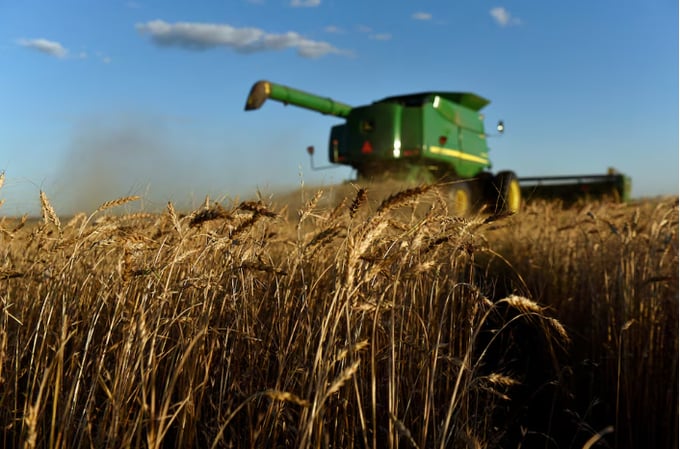May 21, 2025 | 08:00 GMT +7
May 21, 2025 | 08:00 GMT +7
Hotline: 0913.378.918
May 21, 2025 | 08:00 GMT +7
Hotline: 0913.378.918

A combine harvests wheat in Corn, Oklahoma, U.S., June 12, 2019.
Profit is growing further out of reach for U.S. wheat farmers and many do not expect to break even in 2024 as ample global supply keeps prices around their lowest in nearly four years at the same time costs including equipment and transport remain high.
The current state of the U.S. wheat market will hit winter wheat farmers in the Great Plains hard. They may lose money despite having what looks to be their best crop for some time after three years of drought sapped yields and forced farmers to abandon wheat.
U.S. wheat prices have plummeted as cheap supplies from the Black Sea and Europe replenished global stocks of the staple grain, and as plentiful corn harvests worldwide pressure the entire commodity grains complex. U.S. winter wheat will be the first crop to be harvested in a year when U.S. farm income is expected to plummet, signaling tough times ahead for rural America.
Chris Tanner, a farmer in the top wheat growing state of Kansas, said he would need to harvest 10 bushels more per acre than last year in order to break even.
"It's hard to describe how that makes me feel without seeming like an angry farmer with a pitchfork," Tanner said. "It makes me feel like I'm working in vain to raise a superior product."
A Kansas State University analysis showed Kansas farmers would need a yield of roughly 60 bushels, opens new tab per acre at a price of $6.26 per bushel to break even, well above cash prices in the state that have ranged between $5 and $5.80 as well as July futures prices . Winter wheat is harvested in June and July in the Great Plains.
The London-based International Grains Council forecasts a record global grain crop in the 2024-2025 marketing season, reinforcing concerns about a global glut.
While the size of the U.S. winter wheat crop will become clearer in coming weeks, particularly during an annual wheat tour in May, the U.S. Department of Agriculture said on Monday that 55% of the crop is in good-to-excellent condition, the highest for this time of year since 2020.
(Reuters)

(VAN) Attempts to bring down the price of the Japanese staple have had little effect amid a cost-of-living crisis.

(VAN) Fourth most important food crop in peril as Latin America and Caribbean suffer from slow-onset climate disaster.

(VAN) Shifting market dynamics and the noise around new legislation has propelled Trouw Nutrition’s research around early life nutrition in poultry. Today, it continues to be a key area of research.

(VAN) India is concerned about its food security and the livelihoods of its farmers if more US food imports are allowed.

(VAN) FAO's Director-General emphasises the need to work together to transform agrifood systems.

(VAN) Europe is facing its worst outbreak of foot-and-mouth since the start of the century.

(VAN) The central authorities, in early April, released a 10-year plan for rural vitalization.